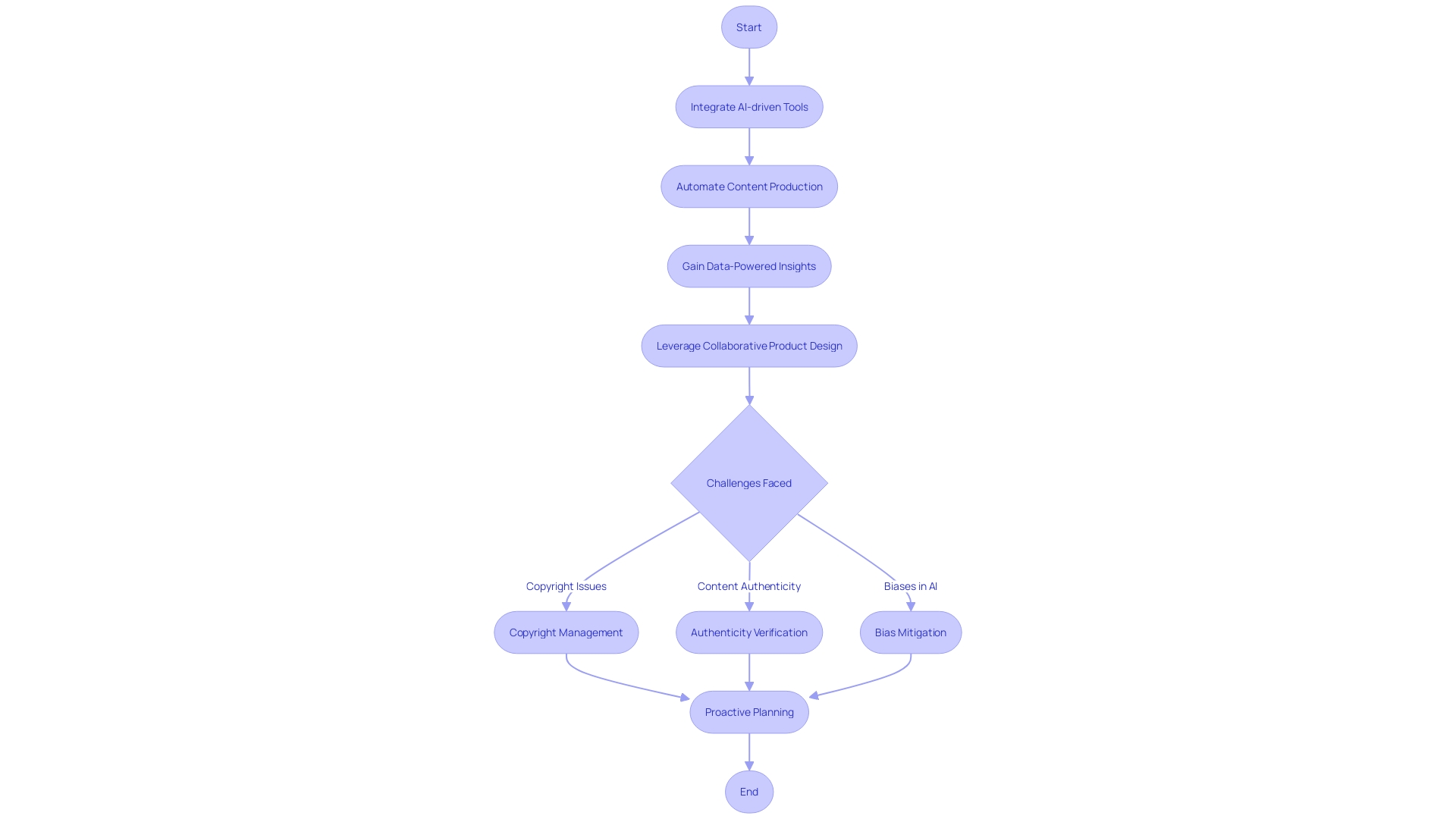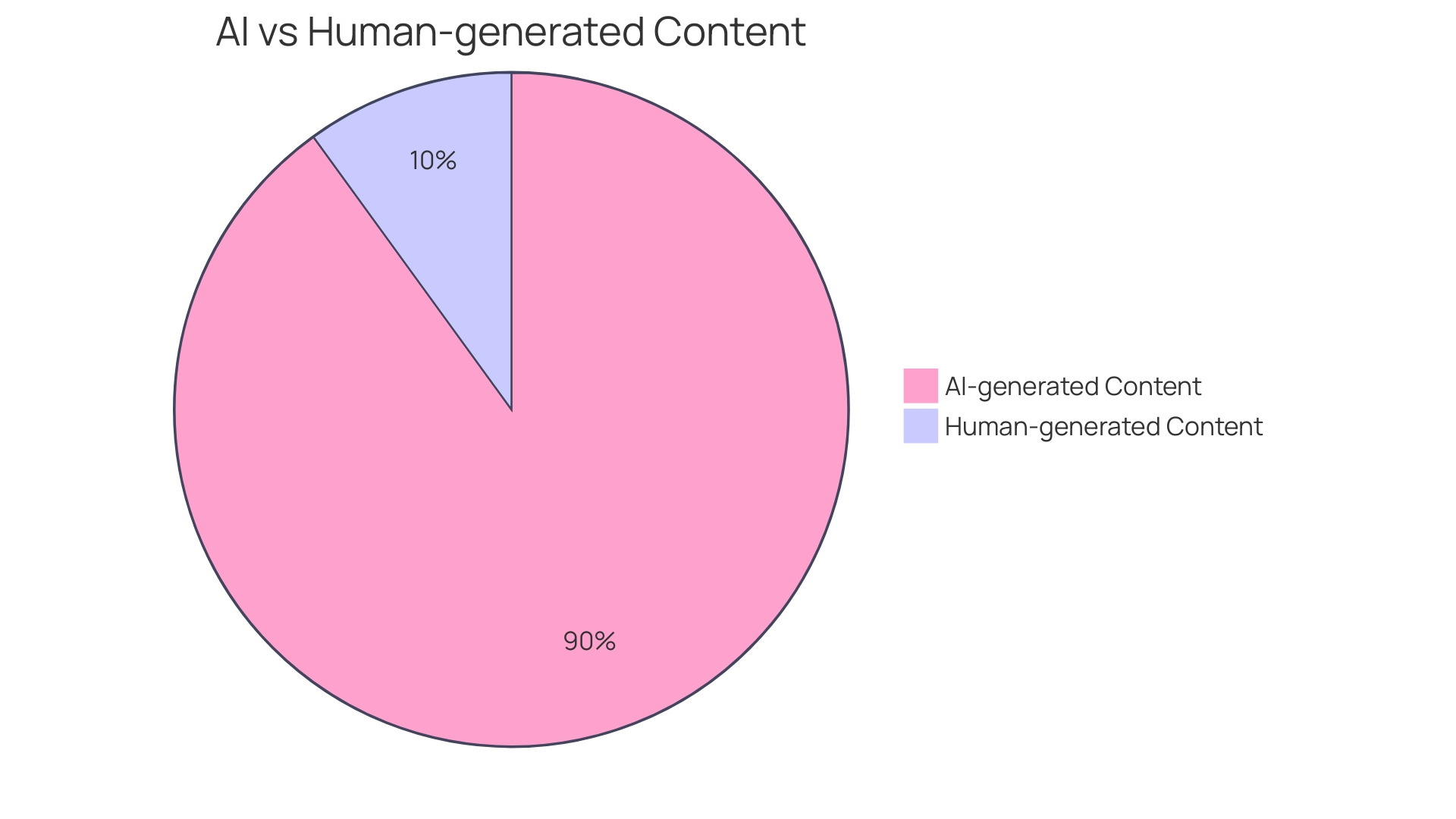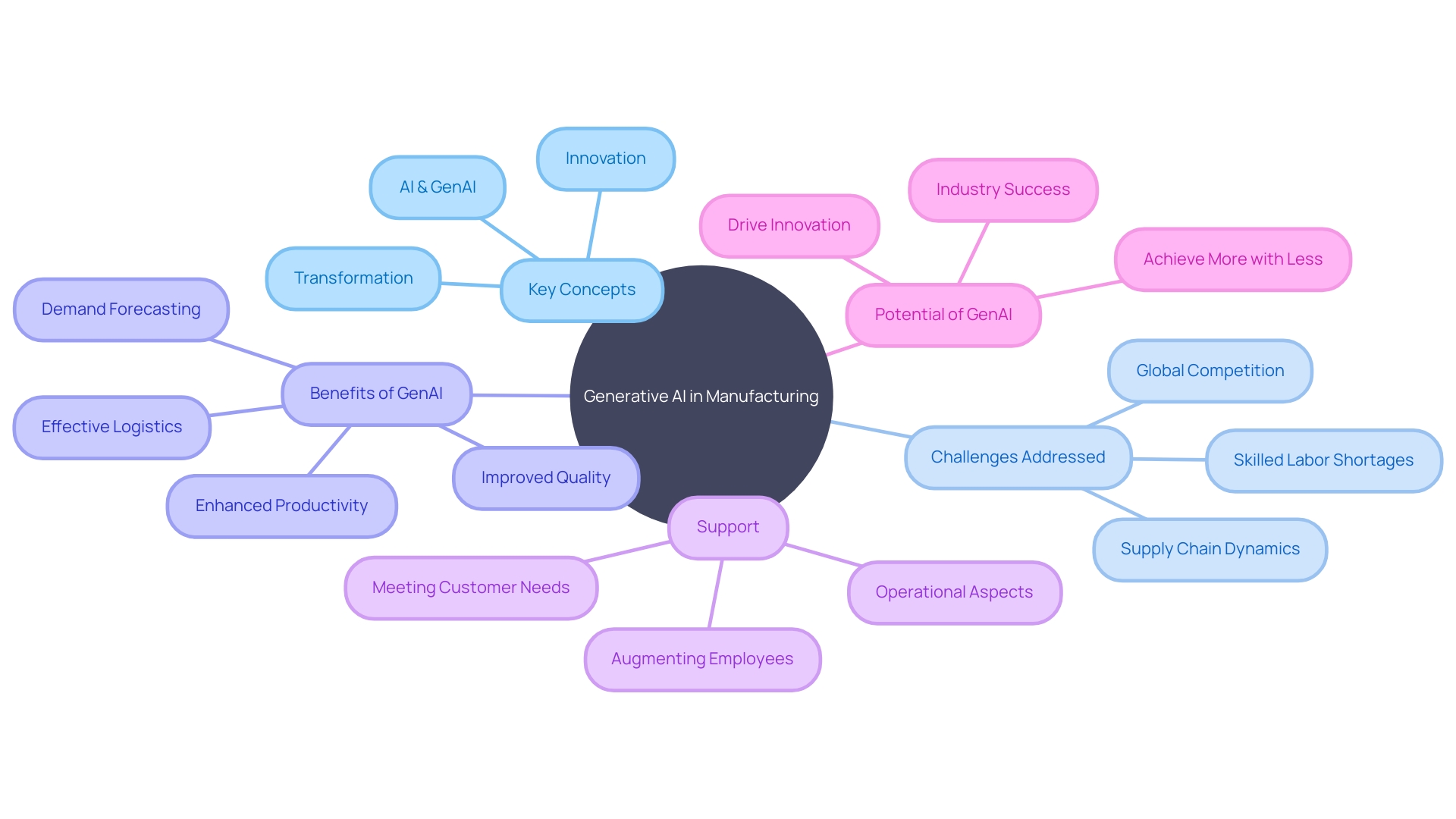Introduction
The landscape of supply chain management is undergoing a remarkable transformation with the advent of generative artificial intelligence (AI). This powerful technology, which elicits a mix of excitement, curiosity, and apprehension, is reshaping industries and driving innovation. In this article, we explore the potential of generative AI in supply chain management and its impact on manufacturing.
We delve into its practical applications, such as enhancing efficiency in content creation and refining inventory management. Additionally, we examine case studies of generative AI implementation and its economic potential as the next frontier of productivity. Join us as we uncover how generative AI is revolutionizing the supply chain sector and propelling businesses towards a future of unparalleled success and innovation.
The Potential of Generative AI in Supply Chain Management
The landscape of supply chain management is being reshaped by the advent of generative artificial intelligence (AI), a transformative force that is eliciting a mixed sense of excitement, curiosity, and apprehension among industry leaders. As organizations grapple with the 'FOMO'—the fear of missing out on the swift pace of innovation—there is an equal measure of 'FOGI', or fear of getting involved, stemming from concerns over trust in AI to augment human roles effectively and to produce content that resonates with their customers.
Despite these fears, the rapid adoption of generative AI is undeniable. In 2023 alone, global enterprises invested approximately $15 billion in generative AI solutions, capturing about 2 percent of the global enterprise software market, a feat that underscores the technology's remarkable growth trajectory.
This financial commitment to generative AI has been paralleled by its practical applications in manufacturing, a sector that has historically been a beacon of progress and innovation. Today, as the industry faces skilled labor shortages, supply chain intricacies, and fierce global competition, generative AI emerges as a potent tool. It offers promising solutions that enhance productivity, quality, and efficiency, ultimately benefiting manufacturers, their workforce, and the broader customer base. This case study delves into the transformative impact of generative AI within supply chain management, showcasing how it is driving innovation and addressing some of the most pressing challenges faced by the industry today.
Enhancing Efficiency with AI-Powered Content Creation
Generative AI is revolutionizing the supply chain sector, particularly in content generation. A prominent supply chain enterprise recently integrated AI-driven tools to automate the production of product narratives and promotional content.
This move has unlocked new horizons, tapping into data-powered insights to gain a competitive edge in content creation. The technology not only streamlines efficiency but also paves the way for collaborative product design, allowing customers to co-create with brands, transforming the future of digital product innovation.
Marketing professionals, including agencies and social media influencers, are early adopters of this technology, seizing the opportunity to enhance productivity and automate the more mundane aspects of creative tasks. However, the adoption of generative AI is not without its hurdles.
Professionals must navigate complexities such as copyright issues, content authenticity, and the inherent biases within AI algorithms. As generative AI continues to evolve, it is shaping a new landscape where large language models, like those behind ChatGPT, and diffusion models are at the forefront of text and visual content creation. Amidst this transformative period, two pressing legal questions arise: who holds the rights to AI-generated content, and can copyright be effectively claimed on AI-produced materials? These concerns underscore the importance of careful deliberation and proactive planning for businesses seeking to leverage generative AI for proprietary content creation.

Transforming Supply Chains: Case Studies of Generative AI Implementation
As we navigate through a critical period marked by geopolitical, economic, and climate crises, the role of generative artificial intelligence (AI) in the supply chain has become a focal point for innovation. The transformative power of generative AI is not just theoretical—it's actively reshaping industries by enhancing productivity, quality, and efficiency. In the realm of supply chains, companies are leveraging generative AI to refine inventory management and demand forecasting, leading to a new era of operational excellence.
These advancements are timely, addressing the current skilled labor shortages and supply chain challenges head-on. The integration of generative AI into manufacturing echoes the sentiment that we're in the midst of one of the most significant transformations since the Industrial Revolution, where the synergy of human and machine intelligence is unlocking unprecedented potential. This is not just a fleeting trend; it's a fundamental shift in how supply chains operate, promising a future where the responsiveness and resilience of businesses are dramatically improved.
The Economic Potential of Generative AI: The Next Productivity Frontier
The landscape of generative AI is fraught with a duality of emotions—excitement paired with both the fear of missing out and the fear of getting involved. Organizations grapple with the pace of content creation and the apprehension of investing in tools whose efficiency remains to be proven.
Trust in AI to enhance employee output and resonate with customers is a pivotal concern. Amidst this climate, generative AI has made a remarkable entry into the business world, with a $15 billion investment by global enterprises in 2023, capturing 2 percent of the global enterprise software market.
This rapid adoption mirrors the earlier rise of software-as-a-service, but at an accelerated rate, marking generative AI as a significant economic force. Its adoption is not only reshaping enterprise software but also signaling a seismic shift in user segments and industry dynamics. The introduction of agentic workflows suggests a reimagining of software applications, pointing towards both value creation and potential market upheaval. This transformative power of generative AI extends to the supply chain sector, where it promises cost savings, revenue growth, and a competitive edge, heralding new horizons for business productivity and economic impact.

Revolutionizing the Content Supply Chain with Generative AI
Generative AI is ushering in a transformative era in the content supply chain, with profound implications for marketing agencies, advertising creatives, news organizations, and social media influencers. These early adopters are harnessing AI to not only enhance efficiency by automating mundane, repetitive tasks but also to elevate the quality of content. Large language models, such as Chat GPT, and diffusion models are at the forefront, generating text, images, and videos by analyzing vast datasets to produce similar outputs.
Yet, this innovation isn't without its complexities. Intellectual property ownership remains a contentious issue, with unanswered questions about who holds the rights to AI-generated content. Moreover, the potential legal challenges surrounding copyright infringement and the ability to protect proprietary assets underscore the need for careful consideration when integrating generative AI into business strategies.
The market for generative AI is on a remarkable trajectory, predicted to expand by $180 billion within the next eight years, and with the startling forecast that 90% of online content might be AI-generated by the following year. This exponential growth, occurring at a CAGR of 35.6%, indicates a surge in investment from AI companies and a commitment to escalating AI spending. However, as we stand on the brink of an AI-augmented reality, the dialogue around the ethical implications of AI in content creation, the future of work, and the impact on global employment, especially with 80% of women's jobs at high risk of automation, becomes increasingly vital.

Generative AI in Supply Chain: Driving Value and Innovation
Generative AI represents a transformative leap in the manufacturing sector, akin to the seismic shifts witnessed during the Industrial Revolution. With its roots deeply embedded in innovation, manufacturing is embracing a new era with artificial intelligence (AI) and its generative counterpart, GenAI. This technological pivot is occurring just as the industry confronts a trifecta of skilled labor shortages, intricate supply chain dynamics, and stiff global competition.
In response, GenAI emerges as a beacon of hope, promising to elevate productivity, enhance quality, and amplify effectiveness. Specifically, GenAI is redefining the supply chain landscape, providing manufacturers with the tools to revolutionize logistics and demand forecasting. The intelligent analysis and data synthesis capabilities of GenAI facilitate precise, informed decision-making, enabling companies to navigate market complexities with newfound agility.
The potential of GenAI in manufacturing is not merely theoretical but grounded in reality. As companies grapple with the dual sensations of FOMO and FOGI—the anxiety of falling behind or the hesitance to adopt new technologies—GenAI stands out as a trustworthy ally. It supports not only the operational aspects but also the human element, augmenting employees and resonating with customer needs.
In an echo of the past, where Tim Berners-Lee's vision of the World Wide Web was once described as "Vague but exciting," we now face a parallel moment of revolution with GenAI. Amidst the backdrop of global crises, GenAI presents a multifaceted solution, offering the means to tackle pressing issues while judiciously utilizing our resources. The promise of GenAI in manufacturing is clear: to achieve more with less, propelling the industry towards a future of unparalleled innovation and success.

The Future of Supply Chain Management: Leveraging Generative AI
The advent of artificial intelligence (AI) and generative AI (GenAI) signals a revolutionary shift in manufacturing, akin to the transformation brought about by the Industrial Revolution. With its capacity for unceasing innovation, manufacturing stands on the cusp of an era defined by remarkable enhancements in productivity, quality, and efficiency. The integration of AI, particularly GenAI, into supply chain management promises to address current industry challenges such as skilled labor shortages and global competition.
As we navigate a period marked by geopolitical, economic, and environmental crises, the strategic implementation of AI offers a beacon of advancement. It's a critical moment where the embrace of GenAI in supply chains could catapult companies to unprecedented levels of innovation and success, mirroring the transformative impact the World Wide Web had on global digitalization. Generative AI, once a niche domain, now emerges as a pivotal technology, poised to revolutionize how manufacturers, their workforce, and consumers interact and thrive in a complex market landscape.
Conclusion
In conclusion, the integration of generative artificial intelligence (AI) into supply chain management is driving innovation and reshaping the manufacturing industry. Generative AI offers practical applications such as enhancing efficiency in content creation and refining inventory management. It revolutionizes the supply chain sector by automating mundane tasks, elevating the quality of content, and enabling collaborative product design.
Case studies have highlighted the transformative impact of generative AI on supply chain management, addressing challenges such as skilled labor shortages and supply chain intricacies. The synergy of human and machine intelligence unlocks unprecedented potential, leading to increased productivity, quality, and efficiency. Generative AI also holds significant economic potential, with global enterprises investing billions of dollars in this technology.
Its adoption is reshaping enterprise software and signaling a shift in user segments and industry dynamics. By leveraging generative AI, businesses can achieve cost savings, revenue growth, and a competitive edge. However, the adoption of generative AI is not without its complexities.
Intellectual property ownership and legal challenges surrounding copyright infringement need careful consideration when integrating this technology into business strategies. Overall, generative AI represents a transformative leap in the manufacturing sector, offering manufacturers the tools to revolutionize logistics, demand forecasting, and operational excellence. By embracing generative AI in supply chain management, companies can propel themselves towards unparalleled success and innovation in an increasingly complex market landscape.





